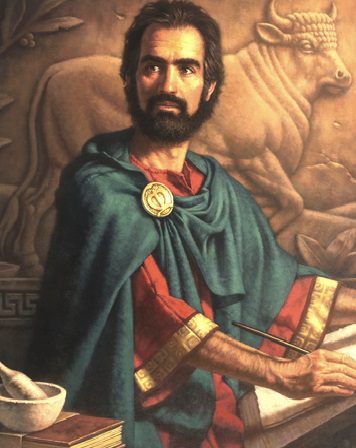
Saint Luke (died at age 84 – circa late 1st century)
Feast Day: October 18
The authorship of both the Gospel of Luke and the Acts of the Apostles has been ascribed to St. Luke, which means that he contributed over a quarter of the text of the New Testament, more than any other author. According to some scholars, Luke also contributed to the authorship of the Epistle to the Hebrews. Scholars also believe that Luke was a Greek physician who lived in the Greek city of Antioch in Ancient Syria.
St. Paul attested that Luke accompanied him in some parts of his missionary journeys (Philemon 1:24, Colossians 4:14), but more importantly, when Paul was held prisoner in Rome: “Only Luke is with me (2 Timothy 4:11).”
The actual date of St. Luke’s death is unknown, but according to tradition, he died at age 84 in Boeotia (circa late first century).
Luke (1:1-4)
Since many have undertaken to compile a narrative of the events that have been fulfilled among us, just as those who were eyewitnesses from the beginning and ministers of the word have handed them down to us, I too have decided, after investigating everything accurately anew, to write it down in an orderly sequence for you, most excellent Theophilus, so that you may realize the certainty of the teachings you have received.
Acts of the Apostles (28:1-25, 30-31)
Once we had reached safety we learned that the island was called Malta. The natives showed us extraordinary hospitality; they lit a fire and welcomed all of us because it had begun to rain and was cold. Paul had gathered a bundle of brushwood and was putting it on the fire when a viper, escaping from the heat, fastened on his hand. When the natives saw the snake hanging from his hand, they said to one another, “This man must certainly be a murderer; though he escaped the sea, Justice has not let him remain alive.” But he shook the snake off into the fire and suffered no harm. They were expecting him to swell up or suddenly to fall down dead but, after waiting a long time and seeing nothing unusual happen to him, they changed their minds and began to say that he was a god.
In the vicinity of that place were lands belonging to a man named Publius, the chief of the island. He welcomed us and received us cordially as his guests for three days. It so happened that the father of Publius was sick with a fever and dysentery. Paul visited him and, after praying, laid his hands on him and healed him. After this had taken place, the rest of the sick on the island came to Paul and were cured. They paid us great honor and when we eventually set sail they brought us the provisions we needed.
Three months later we set sail on a ship that had wintered at the island. It was an Alexandrian ship with the Dioscuri as its figurehead. We put in at Syracuse and stayed there three days, and from there we sailed round the coast and arrived at Rhegium. After a day, a south wind came up and in two days we reached Puteoli. There we found some brothers and were urged to stay with them for seven days. And thus we came to Rome.
The brothers from there heard about us and came as far as the Forum of Appius and Three Taverns to meet us. On seeing them, Paul gave thanks to God and took courage. When he entered Rome, Paul was allowed to live by himself, with the soldier who was guarding him. Three days later he called together the leaders of the Jews. When they had gathered he said to them, “My brothers, although I had done nothing against our people or our ancestral customs, I was handed over to the Romans as a prisoner from Jerusalem. After trying my case the Romans wanted to release me, because they found nothing against me deserving the death penalty. But when the Jews objected, I was obliged to appeal to Caesar, even though I had no accusation to make against my own nation. This is the reason, then, I have requested to see you and to speak with you, for it is on account of the hope of Israel that I wear these chains.” They answered him, “We have received no letters from Judea about you, nor has any of the brothers arrived with a damaging report or rumor about you. But we should like to hear you present your views, for we know that this sect is denounced everywhere.” So they arranged a day with him and came to his lodgings in great numbers. From early morning until evening, he expounded his position to them, bearing witness to the kingdom of God and trying to convince them about Jesus from the law of Moses and the prophets. Some were convinced by what he had said, while others did not believe.
He remained for two full years in his lodgings. He received all who came to him, and with complete assurance and without hindrance he proclaimed the kingdom of God and taught about the Lord Jesus Christ.